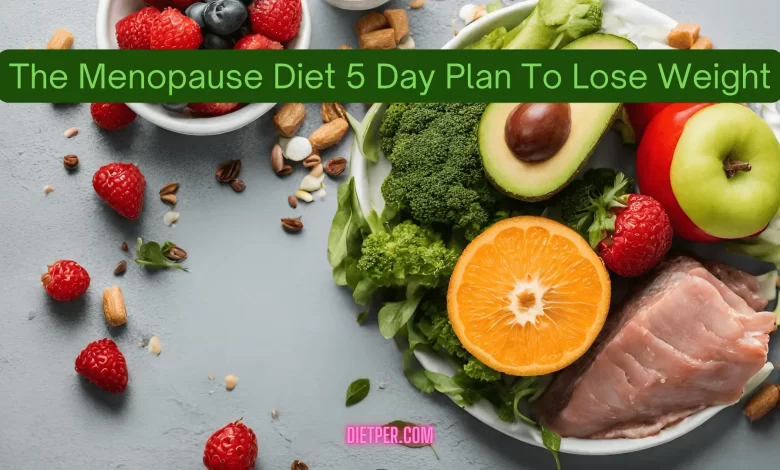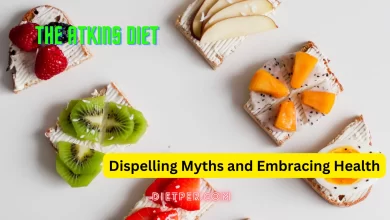The Menopause diet 5 day plan to lose Weight and Thrive
Navigating Menopause: The 5-Day Diet Plan to Embrace Change, Manage Weight, and Renew Vitality

The menopause diet 5 day plan to lose weight Entering the stage of menopause can be a transformative time for women, both physically and emotionally. One common concern that many women face during this period is weight gain or difficulties in losing Weight. Hormonal changes during menopause can affect metabolism and lead to unwanted weight gain. However, it’s important to remember that weight loss is possible and achievable with the right approach.
What is Menopause?
Menopause is a natural biological process that occurs in women as they age. It marks the end of a woman’s reproductive years, typically occurring between the ages of 45 and 55, with the average age being 51. During menopause, a woman’s body undergoes hormonal changes, specifically a decrease in the production of estrogen and progesterone. These hormonal shifts can lead to a range of symptoms, including hot flashes, night sweats, mood swings, fatigue, and weight gain.
As estrogen levels decrease, the body’s metabolism slows down, making it more challenging to maintain a healthy weight. Understanding the impact of menopause on weight management is crucial, as many women struggle with weight gain during this phase of life. However, it’s important to note that weight gain during menopause is not inevitable, and with the right approach, it can be managed effectively.
What is the Menopause Diet Plan?
The menopause diet plan is a structured eating plan designed to support women during the menopausal transition and help them manage their weight effectively. As women approach menopause, hormonal changes can lead to weight gain and difficulty in losing excess pounds.
The menopause diet plan aims to address these challenges by focusing on specific foods and nutrients that can aid in weight loss and promote overall well-being. This diet plan typically emphasizes whole, nutrient-dense foods while limiting processed and high-sugar options. It aims to stabilize blood sugar levels, boost metabolism, and reduce inflammation, which can be particularly beneficial for women experiencing menopausal symptoms and weight fluctuations.
The menopause diet plan commonly includes an assortment of lean proteins such as fish, poultry, and legumes, as well as plenty of fruits and vegetables. These foods provide essential vitamins, minerals, and antioxidants to support overall health and combat common menopausal symptoms like hot flashes and mood swings. In addition, the diet plan often incorporates healthy fats from sources like avocados, nuts, and olive oil, which help promote satiety and support hormone production.
Adequate intake of calcium and vitamin D is also emphasized to support bone health, as women are at an increased risk of osteoporosis during and after menopause. While the menopause diet plan provides a framework for healthy eating, it is essential to personalize it according to individual needs and preferences.
Symptoms Of Menopause
Menopause is a natural biological process that marks the end of a woman’s reproductive years. It is diagnosed after 12 consecutive months without a menstrual period. The symptoms of menopause can vary widely from woman to woman and can range from mild to severe. Common symptoms of menopause include:
- Irregular Periods: The menstrual cycle becomes irregular before stopping completely.
- Hot Flashes: Sudden, intense feelings of warmth, often accompanied by sweating and a rapid heartbeat. Hot flashes can vary in frequency and intensity.
- Night Sweats: Hot flashes that occur during sleep, leading to intense sweating and waking up feeling overheated.
- Vaginal Dryness: Decreased moisture and lubrication in the vaginal area, which can lead to discomfort or pain during sexual intercourse.
- Mood Swings: Fluctuations in mood, including irritability, anxiety, and depression. Hormonal changes during menopause can affect neurotransmitters in the brain, leading to mood changes.
- Sleep Problems: Difficulty falling asleep, staying asleep, or experiencing restful sleep. Night sweats can also contribute to sleep disturbances.
- Fatigue: Many women experience increased fatigue during menopause, which can be due to hormonal changes, sleep disturbances, or other symptoms like night sweats.
- Memory and Concentration Problems: Some women report difficulties with memory, concentration, and mental clarity during menopause. This is sometimes referred to as “menopausal brain fog.”
- Changes in Libido: Reduced sex drive is a common symptom of menopause. This can be due to hormonal changes, vaginal dryness, or other physical and emotional factors.
- Urinary Changes: Changes in urinary habits, such as increased frequency or urgency, can occur during menopause. Some women may also experience urinary incontinence.
- Joint and Muscle Pain: Some women experience joint pain, muscle aches, or stiffness during menopause, which can be related to hormonal changes and aging.
Shopping lists – The menopause diet 5 day plan to lose Weight
When it comes to following a menopause diet for weight loss, having a well-organized shopping list can make all the difference. Planning your meals and having all the necessary ingredients on hand will ensure that you stay on track and make healthy choices throughout the day. Here’s The menopause diet 5 day plan to lose weight shopping list to help you kickstart your menopause diet and support your weight loss goals:
Day 1
– Fresh vegetables (such as leafy greens, broccoli, cauliflower, and bell peppers)
– Lean proteins (chicken breast, fish, tofu)
– Whole grains (quinoa, brown rice, whole wheat bread)
– Low-fat dairy products (Greek yogurt, cottage cheese)
– Fresh fruits (berries, apples, oranges)
Day 2
– Colorful vegetables (carrots, tomatoes, zucchini, eggplant)
– Lean proteins (turkey breast, salmon, lentils)
– Legumes and beans (chickpeas, black beans, kidney beans)
– Healthy fats (avocado, olive oil, nuts and seeds)
– Low-fat dairy or plant-based alternatives (milk, cheese, almond milk)
Day 3
– Cruciferous vegetables (cabbage, Brussels sprouts, kale)
– Lean proteins (lean beef, shrimp, tempeh)
– Whole grains (quinoa, bulgur, whole wheat pasta)
– Fresh herbs and spices (garlic, ginger, turmeric)
– Fresh fruits (pineapple, mango, kiwi)
Day 4
– Leafy greens (spinach, arugula, Swiss chard)
– Lean proteins (chicken, turkey, tofu)
– Nuts and seeds (almonds, flaxseeds, chia seeds)
– Healthy fats (olive oil, coconut oil, avocado)
– Low-fat dairy or plant-based alternatives (yogurt, almond milk, tofu)
Day 5
– Colorful vegetables (bell peppers, beets, squash, asparagus)
– Lean proteins (fish, eggs, legumes)
– Whole grains (quinoa, brown rice, whole wheat bread)
– Fresh herbs and spices (basil, cilantro, rosemary)
– Fresh fruits (strawberries, watermelon, grapes)
Foods To Eat – The menopause diet 5 day plan to lose Weight
When it comes to managing weight during menopause, having a well-balanced diet is key. The right combination of foods can help support hormonal balance, alleviate symptoms, and promote weight loss. Incorporating certain foods into your diet can make a significant difference during this transitional period. Here are some essential foods to include in your menopause diet plan:
- Leafy Greens
Leafy greens like spinach, kale, and Swiss chard are packed with essential nutrients such as calcium, iron, and vitamins A, C, and K. They are low in calories and high in fiber, helping to keep you full and satisfied.
- Lean Proteins
Including lean proteins like chicken, turkey, fish, tofu, and legumes in your diet can help support muscle growth and repair, which is especially important during menopause. These proteins also help regulate blood sugar levels and suppress appetite.
- Whole Grains
Opt for whole grains like brown rice, quinoa, oats, and whole wheat bread, which are rich in fiber and nutrients. They provide sustained energy and can help regulate blood sugar levels, reducing cravings and promoting weight loss.
- Healthy Fats
Incorporate healthy fats from sources like avocados, nuts, seeds, and olive oil into your diet. These fats provide satiety, support brain health, and help absorb fat-soluble vitamins. They also assist in hormone production and balance.
- Fruits and Berries
Enjoy a variety of fruits and berries that are low in sugar and high in vitamins, antioxidants, and fiber. Berries, in particular, are rich in antioxidants and can help combat inflammation and oxidative stress.
Foods To Avoid – The menopause diet 5 day plan to lose Weight
When navigating through the menopause phase, it is essential to pay attention to the foods we consume. Certain foods can exacerbate symptoms and hinder our weight loss goals. In order to make the most out of your menopause diet plan, it is important to be aware of the foods to avoid.
- Processed Foods
Processed foods are often high in unhealthy fats, sugar, and sodium. These can contribute to weight gain, bloating, and water retention. It’s best to steer clear of packaged snacks, sugary drinks, and pre-packaged meals.
- High-Sugar Foods
Excessive sugar intake can lead to weight gain and energy crashes. Avoid sugary treats like candies, pastries, and sodas. Instead, opt for naturally sweetened alternatives like fresh fruits.
- Alcohol
Alcohol can disrupt hormone levels, disturb sleep patterns, and contribute to weight gain. It is advisable to limit or avoid alcohol during menopause to support healthy weight management.
- Spicy Foods
Spicy foods can trigger hot flashes and night sweats in some women. It is recommended to limit the consumption of spicy dishes, especially before bedtime.
- Caffeine and Carbonated Drinks
Caffeine and carbonated beverages can worsen menopause symptoms such as hot flashes and mood swings. It’s best to opt for herbal teas, water, or naturally flavored beverages instead.
By being mindful of these foods to avoid, you can better support your weight loss goals and manage the challenges that come with the menopause phase. Incorporating a balanced and nutritious diet will not only aid in shedding excess Weight but also promote overall well-being during this transformative stage of life.
5-Day Menopause Diet Plan to Lose Weight
Menopause is a natural phase in a woman’s life that brings about various hormonal changes. One common concern for many women during this time is weight gain. As the body adjusts to these shifts, it can become more challenging to maintain a healthy weight. If you’re looking for an effective solution, a well-structured diet plan can be a game-changer. Here’s The menopause diet 5 day plan to lose weight diet plan that can help you lose weight and support your overall well-being.
Day 1
- Breakfast: Start your day with a filling and nutritious meal, such as a vegetable omelet cooked in olive oil.
- Lunch: Enjoy a fresh salad with grilled chicken or fish, topped with a flavorful vinaigrette dressing.
- Snack: Have a handful of nuts or a Greek yogurt for a protein-rich midday snack.
- Dinner: Savor a delicious salmon fillet paired with steamed vegetables and quinoa.
- Dessert: Treat yourself to a refreshing bowl of mixed berries.
Day 2
- Breakfast: Kickstart your morning with a bowl of low-sugar, high-fiber cereal topped with almond milk and sliced fruits.
- Lunch: Indulge in a colorful vegetable stir-fry made with tofu or lean meat of your choice.
- Snack: Munch on carrot sticks dipped in hummus for a satisfying and nutritious snack.
- Dinner: Enjoy a grilled chicken breast alongside roasted Brussels sprouts and a side of brown rice.
- Dessert: Satisfy your sweet tooth with a small square of dark chocolate.
Day 3
- Breakfast: Prepare a wholesome smoothie using spinach, berries, almond milk, and a scoop of protein powder.
- Lunch: Dig into a vibrant salad filled with mixed greens, cherry tomatoes, grilled shrimp, and a lemon-garlic dressing.
- Snack: Enjoy a handful of roasted chickpeas for a crunchy and protein-packed snack.
- Dinner: Delight in a lean beef stir-fry with a colorful array of bell peppers and broccoli, served over cauliflower rice.
- Dessert: Treat yourself to a small serving of Greek yogurt topped with honey and chopped walnuts.
Day 4
- Breakfast: Fuel your day with a delicious avocado and tomato on whole-grain toast sprinkled with a pinch of sea salt.
- Lunch: Devour a satisfying bowl of lentil soup accompanied by a side of mixed greens.
- Snack: Enjoy a sliced apple with a dollop of almond butter for a healthy and filling snack.
- Dinner: Relish a baked salmon fillet with a side of roasted sweet potatoes and steamed asparagus.
- Dessert: Savor a bowl of mixed fruit salad drizzled with a squeeze of lime.
Day 5
- Breakfast: Indulge in a protein-packed spinach and feta omelet cooked in coconut oil.
- Lunch: Enjoy a nourishing bowl of vegetable soup with added beans or lentils for extra protein.
- Snack: Have a handful of pumpkin seeds for a nutrient-dense snack.
- Dinner: Delight in a grilled turkey breast alongside a medley of roasted vegetables and quinoa.
- Dessert: Treat yourself to a small portion of homemade chia seed pudding topped with sliced almonds.
Remember, The menopause diet 5 day plan to lose weight is just a starting point. Feel free to customize it to your preferences. Combined with regular exercise and a healthy lifestyle, this diet plan can help you navigate menopause with confidence and support your weight loss goals.
Some Most Popular Diet Plans:
- The Carnivore Diet Plan: A Unreveal Guide to Success
- The Vertical Diet: A Breakdown of Its Benefits and Drawbacks
- Carnivore Diet vs. Keto: Comparing 2 Low-Carbohydrate (2023)
Tips to Lose Weight During Menopause
The menopause diet 5 day plan to lose weight can be a challenge for anyone, but it can feel even more difficult during menopause due to hormonal changes that can affect metabolism and energy levels. However, with the right approach and a well-planned diet, it is possible to shed those extra pounds successfully. Here are some effective tips to help you lose weight during menopause and feel your best.
- Prioritize a balanced diet
Focus on consuming a well-balanced diet that includes a variety of nutrient-dense foods. Aim for a mix of lean proteins, whole grains, fruits, vegetables, and healthy fats. Avoid or limit processed foods, sugary snacks, and high-calorie beverages.
- Opt for high-fiber foods
Incorporate fiber-rich foods into your meals to help you feel fuller for longer and reduce cravings. Foods like whole grains, legumes, fruits, and vegetables are excellent sources of dietary fiber. They can also support healthy digestion and regulate blood sugar levels.
- Include protein in each meal
Protein is essential for maintaining muscle mass and promoting satiety. Include lean sources of protein such as chicken, fish, tofu, beans, and Greek yogurt in your meals and snacks. This will help you feel satisfied and prevent overeating.
- Control portion sizes
Menopause can bring about changes in appetite, making it important to be mindful of portion sizes. Use smaller plates and bowls to visually trick your brain into thinking you have consumed more. Slow down while eating and listen to your body’s hunger and fullness cues.
- Stay hydrated
Drinking enough water is crucial for overall health and weight management. It can help boost metabolism, prevent overeating, and control cravings. Aim to drink at least 8 cups of water per day, and consider replacing sugary beverages with herbal teas or infused water for added flavor.
How can I raise my estrogen levels quickly?
When it comes to the menopause diet 5 day plan to lose weight, there are many factors to consider, and one of them is the balance of hormones in your body, particularly estrogen levels. Estrogen plays a crucial role in maintaining various bodily functions, including metabolism and weight management. If you’re looking to raise your estrogen levels quickly, here are some tips to consider.
- Include phytoestrogen-rich foods in your diet
Phytoestrogens are plant compounds that mimic estrogen in the body. Adding foods such as flaxseeds, soy products, legumes, and whole grains to your meals can help boost estrogen levels naturally.
- Consume healthy fats
Healthy fats like avocados, nuts, and fatty fish contain essential fatty acids that aid in hormone production. These fats are also important for overall health and can help regulate estrogen levels.
- Eat a nutrient-rich diet
Ensure your diet is well-balanced and includes a variety of fruits, vegetables, lean proteins, and whole grains. These foods provide essential vitamins and minerals that support hormone production and overall well-being.
- Manage stress levels
Chronic stress can disrupt hormone balance, including estrogen levels. Incorporate stress-management techniques like meditation, yoga, or deep breathing exercises into your daily routine to help regulate your hormones.
- Limit exposure to hormone disruptors
Some chemicals found in certain plastics, pesticides, and personal care products can interfere with hormone production and disrupt estrogen levels.
What is the difference Between a carnivore diet and menopause?
The Carnivore Diet and Menopause: Understanding the Connection Menopause can bring about a range of changes in a woman’s body, including weight gain and hormonal imbalances. As women navigate through this transitional phase, it is natural to search for dietary solutions that can help alleviate symptoms and promote overall well-being.
One such diet that has gained popularity in recent years is the carnivore diet. The carnivore diet, as the name suggests, is primarily focused on consuming animal products such as meat, fish, eggs, and dairy while excluding all other food groups like fruits, vegetables, and grains. Advocates of the carnivore diet claim that it can lead to weight loss, improved mental clarity, increased energy levels, and reduced inflammation. However, the question arises – how does the carnivore diet intersect with menopause?
When it comes to menopause, many women experience changes in metabolism and hormonal fluctuations, which can impact weight management. The carnivore diet, with its emphasis on protein-rich foods, can offer certain benefits for women in this phase of life.
Proponents of the carnivore diet argue that it can help stabilize blood sugar levels, reduce cravings, and promote fat loss. By cutting out carbohydrates and focusing on protein and healthy fats, this diet may help regulate hormones, maintain muscle mass, and prevent the accumulation of excess body fat. However, it is important to approach the carnivore diet with caution, especially during the menopause diet 5 day plan to lose Weight. Every woman’s body is unique, and individual needs may vary.
While the carnivore diet may offer some potential benefits for menopausal women, it is crucial to prioritize a balanced and nutrient-dense approach to nutrition. Incorporating a variety of whole foods, including fruits, vegetables, and healthy fats, can help provide essential vitamins, minerals, and fiber that support overall health during menopause.
Frequently Asked Questions
1. Why am I losing weight during menopause?
Weight loss during menopause can occur due to hormonal changes, decreased muscle mass, and changes in metabolism. It can also result from lifestyle changes, such as increased physical activity or changes in dietary habits.
2. What is the weekly diet for menopause?
A balanced menopause diet includes calcium-rich foods, whole grains, fruits, vegetables, lean proteins, and healthy fats. Focus on variety and moderation, aiming for a balanced intake of nutrients throughout the week.
3. What breakfast foods help with menopause?
Breakfast options beneficial during menopause include whole-grain cereals, yogurt with fruits and nuts, and smoothies with leafy greens, berries, and flaxseeds. These provide essential nutrients and fiber for sustained energy.
4. What seeds are good for menopause?
Flaxseeds and sesame seeds are excellent choices. They contain phytoestrogens and essential fatty acids, helping balance hormones and support heart health during menopause.
5. What foods are good for menopause, according to Ayurveda?
Ayurveda recommends incorporating cooling foods like fresh fruits, vegetables, and herbs such as cilantro and mint. Also, include ghee (clarified butter), whole grains, and nuts in your diet. Avoid spicy and processed foods to maintain balance during menopause.
6. Is it a free menopause diet plan?
There are free menopause diet plans available online, offering general guidelines. However, personalized plans from nutritionists may require a fee for tailored advice.
7. What are the healthy snacks for menopause?
Healthy menopause snacks include Greek yogurt with berries, mixed nuts, whole-grain crackers with hummus, vegetable sticks, and dark chocolate. These options provide nutrients and can help manage cravings.
8. What is Stacy Sims’s menopause diet?
Stacy Sims, a renowned exercise physiologist, emphasizes personalized nutrition during menopause. Her approach includes balanced meals with lean proteins, healthy fats, and whole grains. Specific details of her diet plan may vary and are best explored through her resources or consultations.
Final Words
The menopause diet 5 day plan to lose weight can be a powerful tool to help manage Weight during this transitional phase of life. By incorporating a balanced and nutritious meal plan, focusing on whole foods, managing portion sizes, and staying active, women can achieve their weight loss goals while also supporting their overall health and well-being. It’s important to remember that every woman’s experience with menopause is unique, and individual dietary needs may vary.
Embracing the changes that come with menopause and adopting a healthy lifestyle can lead to not only weight loss but also improved energy levels, mood, and overall quality of life. With commitment, patience, and the right mindset, women can navigate through this phase with grace and confidence, embracing the opportunity for positive change and renewed vitality. Remember, the menopause diet 5 day plan to lose weight is not a quick fix but a long-term approach to nourishing your body and taking care of yourself during this important stage of life.
Disclaimer
This blog post aims to empower you to make informed and health-conscious food choices. Your well-being is of paramount importance, and it’s essential to prioritize your health before embarking on any restrictive diets. Therefore, if you have any concerns, it is highly advisable to seek guidance from a healthcare professional or registered dietitian before making dietary changes.







I just could not go away your website prior to suggesting that I extremely loved the usual information an individual provide to your visitors?
Is gonna be again continuously to check out new posts